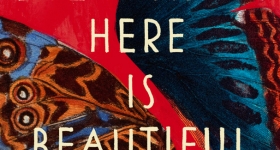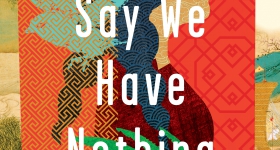TARA MEHTA is just an ordinary South Asian woman in the ancient yet modern city of Sitapur. Little does she know that she is actually the human host of Devi, a female warrior-goddess, who is called to life to fight the Dark God Bala. When Tara finds out her fate, she is reluctant to follow her destiny to save the world. Instead, she is driven to protect Rahul, a burnt-out, alcoholic detective, who saves her life.
How's that for a superhero?
Devi is just one of the graphic novels in Virgin Comic's Shakti Line, a new company spearheaded by New Age guru Deepak Chopra and his son Gotham Chopra; Sharad Devarajan; Shekar Kaupur, a filmmaker known for Elizabeth and Bandit Queen; and Sir Richard Branson, master of the Virgin empire of music, megastores and airlines. The Shakti comics all take their storylines from Indian myths and stones, many re-written with a modernday or Western twist.
The company began when Gotham Chopra teamed up with Devarajan and approached Branson in 2005, after already setting up an artists' studio in Bangalore. Books in the Shakti line can now be found in comic book and Virgin stores throughout the United States and will be released in India in 2007.
Mehta's fellow protagonists include Jessica Peterson of Snake Woman, a young green-haired Midwesterner who is fated to be endlessly reincarnated to hunt a group of 68 men who desecrated a temple; and James Jensen of The Sadhu, a Englishman in the British army posted to India in 1858 who adopts the path of the "Sadhu"-a Samuri-esque way of life-after his family is murdered.
"The Western comic book is dominated by the superhero genre-tights and capes," says Gotham Chopra, chief creative officer of Virgin Comics. "We're mining a whole different themeology, a whole different ethos."
Artist Mukesh Singh speaks to this in his introduction to Devi: "[T]he ancient enmeshed with the ultra modern.... Devi and the world in which she exists in the comic is a study in contrasts; Sadhus brandishing swords and mobile phones; ancient sculptures jutting out from in-between glass and steel structures; modern day discos infested with punks and run by Gods-turned-gangsters."
This focus on South Asian mythology is not the only thing that has produced a buzz in the comic book world. Some applaud Virgin for pushing these diverse characters and interesting storylines, while others are suspicious of the mix of corporate money and traditional stories.
Vijay Prashad, well-known cultural commentator and author of progressive South Asian bible The Karma of Brown Folk, points out that comics are not a new thing for South Asians. He says he grew up reading Amar Chitra Katha, a popular Indian comic which began in 1967 and told the major epic stories of India in comic form.
"Amar Chitra Katha was an effort to allow Indian children to have access to Indian traditions," says Prashad. In contrast, Prashad feels that Virgin's purpose is to make money.
But access to big money doesn't necessarily mean success. Chopra acknowledges that in today's comic book market, it's challenging to carve out a niche to compete with the two titans of the industry, Marvel and DC. He describes Virgin's sales as modest business.
"The days of selling millions of comics are over. That's not what we're trying to do. We want to integrate great stories and work with talented artists and writers, using the comics as a vehicle to storyboard movies, games, television and animation," says Chopra. "We're not necessarily worried about how many comic books we're selling, [more about] developing iconic properties beyond comics."
Virgin Comics plans a Director's Cut line with some of the story ideas coming from Hollywood directors such as John Woo and Guy Ritchie. In addition, Nicholas Cage is slated to star in a film based on The Sadhu.
Multimedia aspirations aside, the originality of the Shakti series has made people in the comic world take notice. Loren Javier, editor of One Diverse Comic Book Nation, a blog about diversity within the comics world, noted that Virgin Comics provides a refreshing new perspective for US comic fans.
"Comic books have always had some kind of connection to myths and legends, but, for the most part, the inspiration has been drawn from Europe. Asia is rich with myth and, yet, has gone virtually untapped," says Javier. "I think it's great that Virgin is bringing Indian myths to a mainstream comics audience."
Not everyone is so positive about Virgin's efforts. Brandeis University Professor Shilpa Dave, co-editor of East Main Street: Asian American Popular Culture, says that the art is fabulous, but questions whether or not Virgin is actually doing something new.
"The comics are steeped in certain mythologies of India and they are trying to meld it in contemporary form, but are still based on common stereotypes of an exotified South Asian woman," says Dave, referring to the art of Dew, specifically.
Even though Chopra insists that the venture isn't about making money, other South Asian artists feel that the Shakti team is cashing in on culture. Indian American visual artist Chitra Ganesh incorporates mythology and the comic form into her own art in a way that interrogates tradition and desire.
"Sure, it's going to be visually engaging and stimulating, and it'll be fun for people to read comic books and mythology," Ganesh says. "But it also speaks to generally mainstream and market-driven visual cultures' attempt to take all things that are seen as subcultural or marginal and incorporate them into the mainstream and make money or product."
Cartoonist Neil Babra agrees. "I really believe in the universal power of expression through comics, but I want to see what truly Indian comics will be like, not comics simply ordered up from Indian artists. The [Virgin] characters don't even seem to be particularly Indian or Indian American; it's sort of like David Carradine in Kung Fu."










Comments